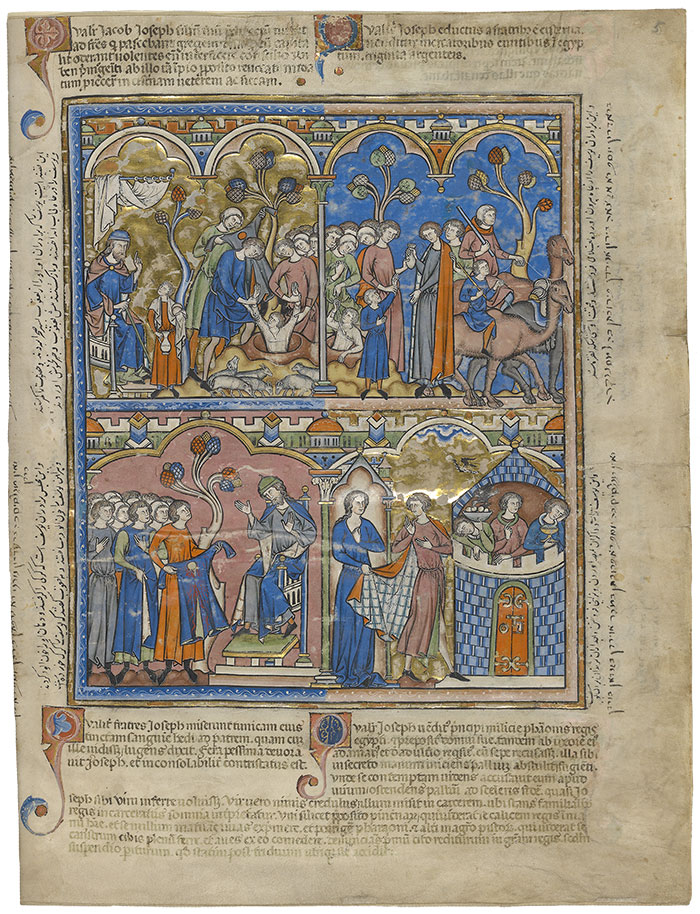
Joseph, a favorite Son, Sold into Slavery, Bad Blood, False Accusations and Portents of the Future
Old Testament Miniatures with Latin, Persian, and Judeo-Persian inscriptions
Purchased by J.P. Morgan (1867–1943) in 1916
Joseph, a favorite Son
Fulfilling the wishes of his father Jacob, Joseph brings bread and wine to his older brothers where they tend their flocks. But the brothers are jealous of Joseph and the favor Jacob has shown to him. He is brutally stripped of the coat his father gave him and lowered into a deep pit. (Genesis 37:12–24)
Sold into Slavery
The brothers return to the pit to sell Joseph into slavery, and he is taken to Egypt on a camel. (Genesis 37:25–28)
Bad Blood
The brothers have torn Joseph's coat and covered it in blood; a horrified Jacob is told that Joseph has been killed by a wild beast. (Genesis 37:31–34)
False Accusations and Portents of the Future
In Egypt, Joseph refuses the advances of his master's wife, who grasps his cloak as he flees. He is wrongly accused of adultery and put in prison, but his ability to interpret the dreams of his cell-mates will shortly result in his freedom. (Genesis 40:9–17)
Folio 5r (Latin)
Upper left: How Jacob sent Joseph, his dearest son to his brothers who were tending the flock and these, as they hated him mortally and wished to kill him, revoked such an impious plan by the counsel of Reuben, the firstborn and cast him, having stripped him, into a pit, pristine and arid. (Genesis 37: 3–24)
Upper right: How Joseph was drawn out of the pit by his brothers and sold for thirty pieces of silver to merchants on their way to Egypt. (Genesis 37: 25–28)
Lower left: How Joseph’s brothers sent his coat, soiled in kid’s blood, to their father and he, when he had seen the coat said mournfully: ’An evil beast has devoured Joseph’; and he was saddened beyond consolation. (Genesis 37: 29–35)
Lower right: How after Joseph was sold to Pharaoh’s captain of the guard and was made an overseer over his house, at length his master’s wife fell in love with him and desired him to commit adultery with her. But when he had often refused, she secretly lay hand on him and snatched away his mantle as he was fleeing. Wherefore, seeing that she was put in contempt, she accused him in front of her husband, displaying the garment to add credibility to the charge, as if Joseph had wished to attack her. And indeed, the man, trusting her much, sent him to prison. There he was interpreting the dreams of the king’s imprisoned servants. One of these, the chief of butlers, saw himself with the king’s cup in his hand into which he was pressing ripe clusters of grapes offering it to Pharaoh. The other, the chief of bakers, saw himself carrying a basket of baked goods while birds were eating of it. Joseph declared that the first one was soon about to win the king’s favor again, while the second was about to die by hanging. And this befell both in three days. (Genesis 39, 40)
Folio 5r (Persian)
Upper left margin: This is the story of Joseph whose brethren [took] him from Jacob to the fields and with enmity cast Joseph into a waterless well; they returned to Jacob and brought [him] the news of his loss.
Upper right margin: And here, the brethren draw Joseph out of the well and sell him into slavery; his worth was assessed at thirty coins of silver.
Lower left margin: This is the image of Joseph’s brethren who captured a wolf and smeared his mouth with blood and smeared Joseph’s shirt with blood and they told Jacob that the wolf had devoured Joseph.
Lower right margin: And here, the merchants bring Joseph to Egypt and sell [him] to Zulaikha and Joseph’s imprisonment thereafter.
Folio 5r (Judeo-Persian)
Upper left margin, furthest left: This is the scene when the brothers took Joseph [and] threw him into a dry well.
Upper right margin, furthest right: The brothers took Joseph out of the well and sold him for a tribute of thirty [pieces] of silver.
Lower left margin, furthest left: This is the scene when, afterwards, having caught a wolf, they [the brothers] smeared Joseph’s shirt with [the wolf’s] blood.
Lower right margin, furthest right: This is the scene when, Joseph having been sold in Egypt, is imprisoned.
Italicized words are in Hebrew.
Content consultant: Richard Leson
Persian translated by Sussan Babaie
Judeo-Persian translated by Vera Basch Moreen
Latin translation by Eran Lupu
After the commentary volume accompanying the Fine Art Facsimile edition by Faksimile Verlag Luzern
